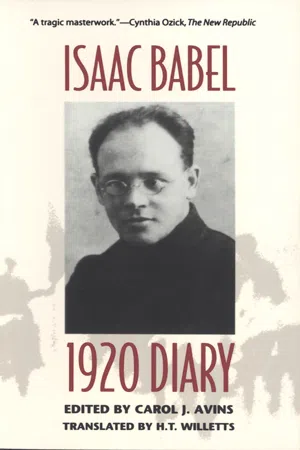
- 192 pages
- English
- PDF
- Available on iOS & Android
1920 Diary
About this book
This diary by the famed twentieth-century Russian writer recounts Babel’s experiences with the Cossack cavalry during the Polish-Soviet war of 1919–1920. The basis for Red Cavalry, Babel’s best-known work, it records the devastation of the war, the extreme cruelty of the Polish and Red armies alike toward the Jewish population in the Ukraine and eastern Poland, and Babel’s own conflicted role as both Soviet revolutionary and Jew.
“Babel’s 1920 Diary, the source for many of his remarkable Red Cavalry stories, is itself as remarkable as the stories, particularly when one considers that the diarist was a journalist of only twenty-six. The staccato sentences in which Babel rapidly describes the horrific details of revolutionary brutality have the impact of an accomplished style, one that in its spontaneously elliptical way is strangely no less artful than the artfully nuanced directness that is the triumph of Red Cavalry.”—Philip Roth
“An electrifying translation accompanied by an indispensable introduction. . . . Babel’s journey is a Jewish lamentation . . . a tragic masterwork.”
—Cynthia Ozick, The New Republic
“A precursor of Holocaust literature, and more powerful in its effect than any Holocaust literature that I have managed to read.”—Harold Bloom, New York Times Book Review
Isaac Babel was born in Odessa in 1894 and was shot in Lubyanka prison in 1940. Carol J. Avins is associate professor of Russian literature at Rutgers University.
Tools to learn more effectively

Saving Books

Keyword Search

Annotating Text

Listen to it instead
Information
Table of contents
- Contents
- List of Illustrations
- Editor's Acknowledgments
- Editor's Note on the Translation
- Map of Poland in the Era of the Polish-Soviet War
- Map of Babel's Route with the First Cavalry Army
- Introduction: Isaac Babel's "Red Cavalry" Diary
- 1920 Diary
- Appendix: Babel's Publications in the Red Cavalryman
- Notes to Babel's Texts
Frequently asked questions
- Essential is ideal for learners and professionals who enjoy exploring a wide range of subjects. Access the Essential Library with 800,000+ trusted titles and best-sellers across business, personal growth, and the humanities. Includes unlimited reading time and Standard Read Aloud voice.
- Complete: Perfect for advanced learners and researchers needing full, unrestricted access. Unlock 1.4M+ books across hundreds of subjects, including academic and specialized titles. The Complete Plan also includes advanced features like Premium Read Aloud and Research Assistant.
Please note we cannot support devices running on iOS 13 and Android 7 or earlier. Learn more about using the app